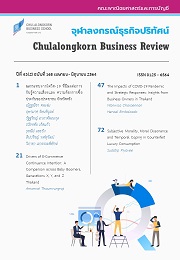Subjective Morality, Moral Dissonance and Temporal Coping in Counterfeit Luxury Consumption
Main Article Content
Abstract
Current research aims to understand how subjective morality in counterfeit luxury consumption influences consumers’ experiences regarding their consumption, moral dissonance and how they cope with such issue. Subjective interpretation of morality in the context of counterfeit luxury consumption leads these consumers to experience their consumptions differently, to face moral dissonance at different times, and to cope with problems with different strategies over the course of counterfeit consumption journey (i.e. pre-purchase, purchase, consumption and post-consumption). 1) Phenomenological interviews on 31 informants who purchase and own both counterfeit and authentic luxury fashion products, 2) netnography and 3) autoethnography were conducted to understand the naturalistic setting of counterfeit luxury market in Bangkok, Thailand. Findings suggest that subjective morality from perspectives of counterfeit luxury consumers forms what constitutes rights and wrongs leading to these consumers to experience their consumption differently, feeling negative feelings from moral dissonance at different times, and coping with such feelings using different temporal coping strategies throughout their counterfeit luxury consumption journeys. In addition, findings from current research provides practitioners, policy makers and luxury brands with understandings on what, how, when and on who to implement strategic interventions and brand building in order to encourage or nudge these consumers to moral consumption.
Article Details
Opinions and discussions in papers published by the Creative Business and Sustainability Journal (CBSJ) are deemed as personal opinions and the responsibility of the writers. They are not the opinions or responsibility of the Chulalongkorn Business School of Chulalongkorn University.
Papers, content, information etc. appearing in the Journal are deemed to be the copyright property of the Chulalongkorn Business School of Chulalongkorn University. Anybody or any organization that wishes to publish any part of them or use them in any way must obtain written permission from the Chulalongkorn Business School, Chulalongkorn University.


